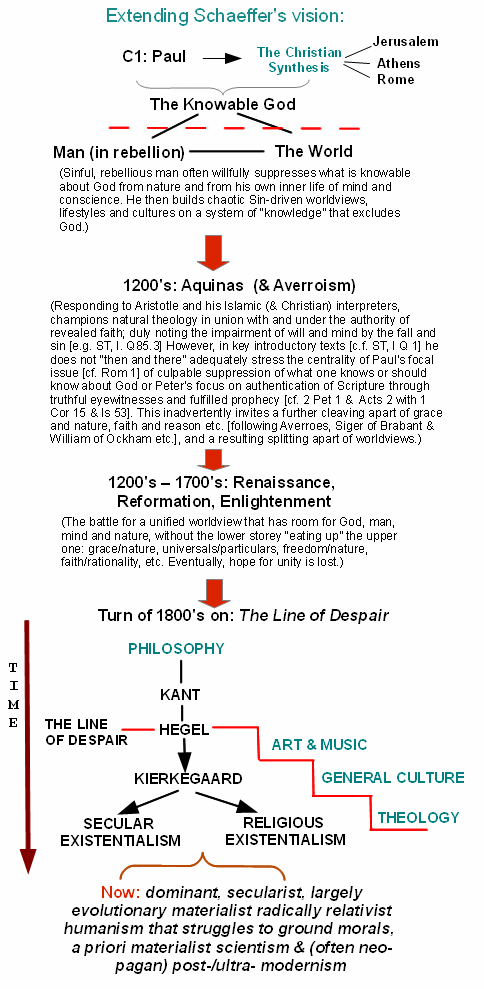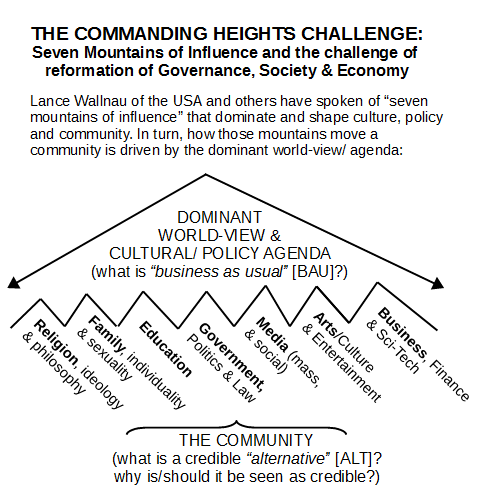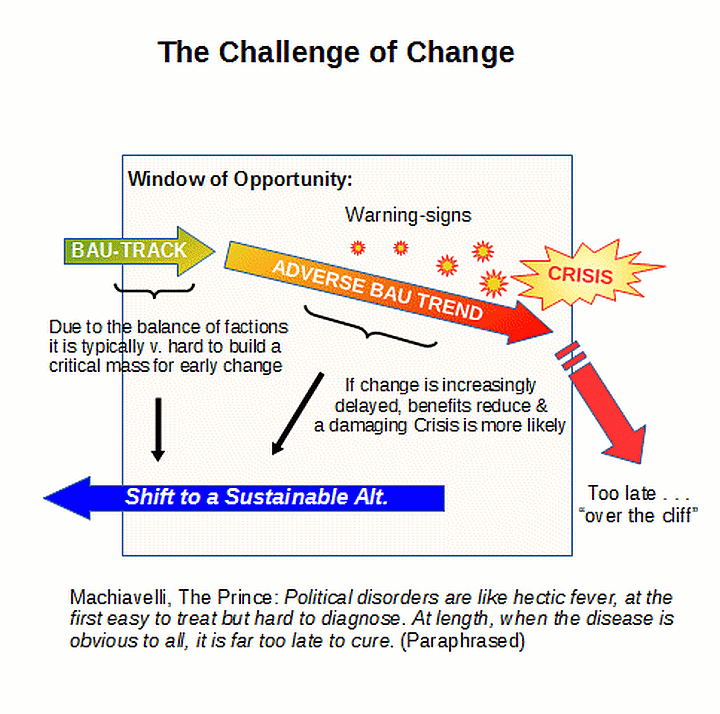How can we break out of our present peril, as a civilisation?
Let’s pause and hear Francis Schaeffer on the subject:
A key aspect of the challenge, is that Democracies, from the days of Plato, are known to be prone to decay into misrule and marches of folly driven by manipulated mobs.
Hence, the concept, demagogue:
demagogue or demagog
n
1. (Government, Politics & Diplomacy) a political agitator who appeals with crude oratory to the prejudice and passions of the mob
2. (Government, Politics & Diplomacy) (esp in the ancient world) any popular political leader or orator
[C17: from Greek d?mag?gos people’s leader, from d?mos people + agein to lead]
Collins English Dictionary – Complete and Unabridged, 12th Edition 2014 © HarperCollins Publishers 1991, 1994, 1998, 2000, 2003, 2006, 2007, 2009, 2011, 2014
Of course, often the demagogue is part of a stable of bought and paid for actors, backed by some Mr Moneybags behind the scenes.
Sometimes, there are far more sinister networks with mostly hidden, escalating, ruinous agendas. Just to list:
- mobs or even militias on the streets,
- crudely populist agitators,
- more cultured literary voices and/or literal actors and celebrities with popular followings,
- pundits, academics and other high prestige experts,
- think-tanks, public relations strategists and agencies,
- marketers, agit-prop strategists,
- media houses,
- parties
- and more.
If we have not drawn these frightening lessons from the history of C20, with both the Communists/Bolsheviks and their kissing-cousins the Nazis/Fascists, we have yet again failed to learn lessons of sound history that were paid for in literal rivers of blood.
Maybe, we need to read Canetti’s Crowds and Power.
Perhaps some thoughts on the heirs of both, today’s Alinskyite cultural marxists, would be advisable.
Now, too, where there is a howling, menacing mob on the streets or in your workplace or online pushing a powerful and destructive attack-agenda, you can bet your bottom dollar that somewhere, there is a paymaster backed by serious money. Which, can even be the lead bureaucrats of the increasingly powerful state apparatus, the so-called deep state and their allies in the intelligentsia who are bought with grant money.
(This, BTW is my read of the ongoing mid-game play-out in North America [no, the end-game of the current, battle- of- attrition- by- mob- and- lawfare- driven- personal- ruin cultural civil war is not yet], i/l/o my observations on trends with the increasingly obviously utterly unstable UK. Three PM’s in four or so years is not a good sign.)
Ac 27 has in it a raft of sobering lessons we have yet to seriously attend to, draw lessons from and absorb in the Churches, much less the wider culture. And so does a lot more of what now seem to be hidden, derided corners of willfully silenced and forgotten history of our common civilisation. One, once rightfully called Christendom . . . with all its sins, struggles and blessings; but which, having willfully and angrily cut itself off from its vital roots through the oppression thesis, now begins to decay disgustingly as it withers.
It is now very hard to find a decent survey history of our civilisation, something that used to be commonly taught in colleges and schools; a bad sign. [I shrug, then suggest here as an obviously flawed outline.]
So, yes, of all people the notorious Vox Day [NOT generally endorsed but he has drawn up a useful survival guide for the mobbed], in his description of mobbing, job-busting, deplatforming and scapegoating-driven marginalisation:
The eight stages of the SJW attack sequence are as follows:
1] Locate or Create a Violation of the Narrative. [–> used to be: the party-line, cf. Orwell, 1984 and Animal Farm]
2] Point and Shriek. [–> slander to smear and mark the target]
3] Isolate and Swarm. [–> mob-riot and bullying or lynching]
4] Reject and Transform. [–> the scapegoat carries away the sins of the multitude, which must now ever more conform to the agenda of “new” “virtues” demanded by the radicals and their mobs . . . generally ending in reigns of terror if unchecked]
5] Press for Surrender. [–> demand to dominate by nihilistic power disguised as claims for justice]
6] Appeal to Amenable Authority. [–> more interested in “reputational damage” than justice]
7] Show Trial. [–> a highlight of both Stalin and Hitler’s Nazis, the media-amplified kangaroo court, also going back to Robespierre and the guillotine. With Rommel, just the threat with further threat to ruin family caused him to commit suicide. This was followed by the show state funeral.]
8] Victory Parade.[–> with the decapitated head on a pike or the like, don’t forget, attainting of the bloodline by ruining the family]
Here, I suggest, that we need voices that can draw together a body of insights toward effective, sound strategic solutions. However, where there are the powerful who profit from continued chaos and/or from manipulated agendas, any moves towards such sound synthesis or a way out of the chaos-maze will be viciously targetted by the ruthless reprobates.
And the attack-mob baying for metaphorical or literal blood (think about Rome’s policy of bread and circuses and its modern extensions) is one of the habitually resorted to tools of such; whenever there are times where such mobs can gain traction.
Yes, another compass-needle pointing to the peril of our times.
Now, let us turn to a source that I find refreshing by sharpest contrast; Pascal, in some of his opening remarks for Pensees. For, we need an idea of where to find a way forward:
1. The difference between the mathematical and the intuitive mind.—In the one, the
principles are palpable, but removed from ordinary use; so that for want of habit it is difficult
to turn one’s mind in that direction: but if one turns it thither ever so little, one sees the
principles fully, and one must have a quite inaccurate mind who reasons wrongly from
principles so plain that it is almost impossible they should escape notice.But in the intuitive mind the principles are found in common use and are before the
eyes of everybody. One has only to look, and no effort is necessary; it is only a question of
good eyesight, but it must be good, for the principles are so subtle and so numerous that it
is almost impossible but that some escape notice. Now the omission of one principle leads
to error; thus one must have very clear sight to see all the principles and, in the next place,
an accurate mind not to draw false deductions from known principles.All mathematicians would then be intuitive if they had clear sight, for they do not
reason incorrectly from principles known to them; and intuitive minds would be mathem-
atical if they could turn their eyes to the principles of mathematics to which they are unused.The reason, therefore, that some intuitive minds are not mathematical is that they cannot
at all turn their attention to the principles of mathematics. But the reason that mathematicians
are not intuitive is that they do not see what is before them, and that, accustomed to the
exact and plain principles of mathematics, and not reasoning till they have well inspected
and arranged their principles, they are lost in matters of intuition where the principles do
not allow of such arrangement. They are scarcely seen; they are felt rather than seen; there
is the greatest difficulty in making them felt by those who do not of themselves perceive
them. These principles are so fine and so numerous that a very delicate and very clear sense
is needed to perceive them, and to judge rightly and justly when they are perceived, without
for the most part being able to demonstrate them in order as in mathematics, because the
principles are not known to us in the same way, and because it would be an endless matter
to undertake it. We must see the matter at once, at one glance, and not by a process of
reasoning, at least to a certain degree.And thus it is rare that mathematicians are intuitive
and that men of intuition are mathematicians, because mathematicians wish to treat matters
of intuition mathematically and make themselves ridiculous, wishing to begin with definitions
and then with axioms, which is not the way to proceed in this kind of reasoning. Not that
the mind does not do so, but it does it tacitly, naturally, and without technical rules; for the
expression of it is beyond all men, and only a few can feel it.Intuitive minds, on the contrary, being thus accustomed to judge at a single glance, are
so astonished when they are presented with propositions of which they understand nothing,
and the way to which is through definitions and axioms so sterile, and which they are not
accustomed to see thus in detail, that they are repelled and disheartened.But dull minds are never either intuitive or mathematical.
There are minds that are both broadly intuitive and aware, seeing synoptically and synthetically on picking up deep, reliable and powerful patterns/principles from clues AND are then able to be exactingly precise in forming and drawing out plausible postulates and logical-structural, qualitative/existential and quantitative consequences.
Such are apt to be found among physicists, big-picture philosophers who tackle big issues, philosophical theologians, big-picture economists of the first rank [including among the Austrian heretics], certain types of similarly big picture but profoundly insightful cultural/policy critics or great artists and historians.
(Let me note for record: Marx was a spoiled case, whose correct insights need to be carefully harvested from the many errors of his materialism, and soundly, wisely put together with many others. Starting, with the lessons of the reformation and the breakthrough American Experiment. We must not allow an over-emphasis on the sins of Christendom to blind us to the hard-bought advances and blessings, as well as the proved mechanisms for prudent incremental reformation rather than ill-advised radical experiments that due to lack of checks, balances, soundness and restraint, predictably end in tyranny and chaos. One of the things we must recover is our confident, well-founded faith in God, in the gospel, in gospel ethics [thus, in linked natural law] and in the scriptures attested by the resurrection of the Christ witnessed by the five hundred.)
It is no accident that Pascal was a Mathematician-Physicist, philosopher with theological bent and one of the pioneers of highest French style. Minds like that are multiply rare: simultaneously rare on multiple dimensions.
But, in an age of widespread communication at low cost, we can learn from such synoptic thinkers, starting with realising that a few thousand words are powerfully distilling many thousands of pages (or even thousands of books) of reading and even more hours of pondering and deep discussion among the truly informed . . . as opposed to mere purveyors and guardians of current academic shibboleths. (Here, compare Ac 17 and 27 with 1 Cor 1 – 2.)
In short, let us learn enough broadly about our civilisation and big, fundamental issues that we can begin to work our way out of the problematique we are manifestly in, willfully and foolishly dancing on the edge of a crumbling cliff.
It matters not, whether the words used to bring out the synthesis are original or are clipped, the issue is, let us find valuable, instructive, wise and promising synthesis.
Let me give one clue, tracing to Francis Schaeffer:

He and others have also given a handy way to see the way ideas dominate a culture, and how we may go about reformation. So, more food for thought:

As a third, here is a summary on the challenge of change:

Ours, is a perilous time.
A kairos, fraught with consequences.
Let us make good use of it, before it is too late. END